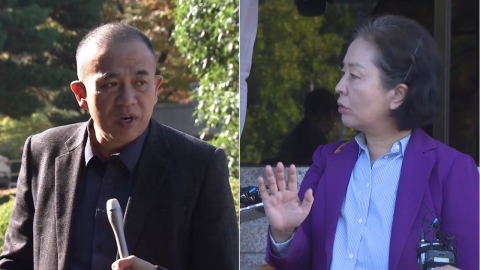"Only 'this' survived the heat wave." Seafood that is in season despite high temperatures is in season.
이미지 확대 보기

■ Broadcast: YTN Radio FM 94.5 (09:00-10:00)
■ Host: Reporter Cho Tae-hyun
■ Air date: December 2, 2024 (Monday)
■ Dialogue: Director Jeong Ji-hee of the Korea Agro-Fisheries & Food Trade Corporation
* The text below may differ from the actual broadcast content, so please check the broadcast for more accurate information.
■ Host: Reporter Cho Tae-hyun
■ Air date: December 2, 2024 (Monday)
■ Dialogue: Director Jeong Ji-hee of the Korea Agro-Fisheries & Food Trade Corporation
* The text below may differ from the actual broadcast content, so please check the broadcast for more accurate information.
◆ Reporter Cho Tae-hyun (hereinafter referred to as Cho Tae-hyun): It's a week to look at the vivid price information of traditional markets and hypermarkets to see what the most delicious and cheap seasonal food is. Jung Ji-hee, manager of the Korea Agro-Fisheries & Food Trade Corporation, is calling. How are you, sir? There was a snow bomb in Seoul last week, and I wonder what Naju, where the at headquarters is located, was like. The reason I brought up the snow bomb is because... It's us, too, but I was worried if vegetables would be okay. Please tell me about this week's shopping basket trend along with the related news.
◇ Jung Ji-hee (hereinafter referred to as Jung Ji-hee), Director of the Korea Agro-Fisheries & Food Trade Corporation: Hello. When it gets cold suddenly, the price of thin leafy vegetables, which are affected by the weather, is also affected. It was a warm winter before the snow fell, and the amount of sunlight was good, so the price of vegetables was still good. Lettuce was around 1,380 won per 100 grams in the third week of November, but it was trading at a price that dropped to 1,170 won last Friday. These days, sweet and savory winter spinach grown on the beach such as Yeonghae and Namhaecho stands out. Spinach prices also fell to 931 won last Friday, down 9.3 percent in 10 days, if they were traded at 1,000 won per 100 grams around November 20. The price of facility crops where sunlight is important, such as paprika, zucchini, and cheongyang red pepper, was also on the decline. Paprika, which was around 2,000 won per 200 grams in early November, fell about 15% to 1,722 won at the end of the month. Zucchini was between 2,500 won and 2,600 won at the beginning of the month, but recently it has fallen to 1,754 won, and Cheongyang red pepper has also fallen from 1,600 won to 1,700 won to 1,300 won recently.
◆ Cho Tae-hyun: Some vegetables went up in price, right?
◇ Jung Ji-hee: The price of melons and cucumbers went up. Both are representative summer crops. In the previous week, it was around 13,000 won per unit, but recently, melon prices are around 15,800 won. Cucumber is low in summer, when it is in season, and on the contrary, it is expensive every year in winter. If it was around 1,350 won per unit around mid-November, when it got cold, it rose slightly to 1,400 won per unit at the end of November.
◆ Cho Tae-hyun: I think it's good to find seasonal agricultural products in season, both in terms of taste and price, but did you have any other items that have increased in price?
◇ Jung Ji-hee: The price of chives and gats has gone up. Jeonju was difficult to harvest due to the heavy snow, and it was not easy to distribute supplies. Both of these vegetables are essential for kimjang seasoning. I heard that kimchi is soft and delicious when it's warm, and it's crisp and delicious when it's cold. Cold weather has reduced supply, while prices have risen due to demand for kimchi. Gad was around 3,600 won per kg around mid-November, but it rose slightly to 4,000 won last week, the latter half. Chives were also around 7,500 won per kg in mid-November, but they went up to 8,700 won at the end of November.
◆ Cho Tae-hyun: Do you make kimchi yourself? I heard you will introduce an event that would be good for those preparing kimchi to participate.
◇ Jung Ji-hee: The government's discount support project for agricultural and livestock products will only be held until December 4, this Wednesday. The 20% discount includes main ingredients such as cabbage and radish, as well as seasoned vegetables such as garlic and onions. Even if you don't make kimchi, onions, garlic, green onions, and red pepper powder are vegetables that are always filled in the refrigerator so that they don't fall off. There are only a few days left, so please make sure to take it. Even if you don't go to the mart yourself, delivery to your house is also active these days, so it would be good to use it. And we are briefly hosting an event to certify kimchi on our aT blog. It's until next Monday, so please take a moment to attend and receive a pork giveaway.
◆ Cho Tae-hyun: Finally, please recommend seasonal agricultural and fishery products this week.
◇ Jung Ji-hee: The ingredients I always eat at this time of the year are oysters and mussels. I don't think there's anyone who doesn't know the nutrients of oysters, and you eat them raw with kimchi and before. So oysters are good, but I'd like to recommend scallops. The shell resembles a fan, so it is also called a fan shell. Scallops are said to be very cheap this year. As of the end of November, it is around 7,500 won per kg. Oyster and scallops are not affected by the high water temperature that continued this year due to their thick shells, so the fishing environment is good.
◆ Cho Tae-hyun: Scallops are simpler to cook than you think, so you can steam them like boiling wine or mirin, or you can just grill them in butter and sprinkle them with cheese and parsley powder. It's also good for year-end cooking.
◇ Jung Ji-hee: Yes, scallops are not something you like or dislike. It is a low-calorie food and rich in calcium and taurine, so it is good for children's growth and development, and it is also good for those who are worried about arteriosclerosis. It is expected to be quite cheap this year, so please refer to it and set up a rich table.
◆ Cho Tae-hyun: This has been Jung Ji-hee, manager of the Korea Agro-Fisheries & Food Trade Corporation. Thank you for talking today, manager.
◇ Jung Ji-hee (hereinafter referred to as Jung Ji-hee), Director of the Korea Agro-Fisheries & Food Trade Corporation: Hello. When it gets cold suddenly, the price of thin leafy vegetables, which are affected by the weather, is also affected. It was a warm winter before the snow fell, and the amount of sunlight was good, so the price of vegetables was still good. Lettuce was around 1,380 won per 100 grams in the third week of November, but it was trading at a price that dropped to 1,170 won last Friday. These days, sweet and savory winter spinach grown on the beach such as Yeonghae and Namhaecho stands out. Spinach prices also fell to 931 won last Friday, down 9.3 percent in 10 days, if they were traded at 1,000 won per 100 grams around November 20. The price of facility crops where sunlight is important, such as paprika, zucchini, and cheongyang red pepper, was also on the decline. Paprika, which was around 2,000 won per 200 grams in early November, fell about 15% to 1,722 won at the end of the month. Zucchini was between 2,500 won and 2,600 won at the beginning of the month, but recently it has fallen to 1,754 won, and Cheongyang red pepper has also fallen from 1,600 won to 1,700 won to 1,300 won recently.
◆ Cho Tae-hyun: Some vegetables went up in price, right?
◇ Jung Ji-hee: The price of melons and cucumbers went up. Both are representative summer crops. In the previous week, it was around 13,000 won per unit, but recently, melon prices are around 15,800 won. Cucumber is low in summer, when it is in season, and on the contrary, it is expensive every year in winter. If it was around 1,350 won per unit around mid-November, when it got cold, it rose slightly to 1,400 won per unit at the end of November.
◆ Cho Tae-hyun: I think it's good to find seasonal agricultural products in season, both in terms of taste and price, but did you have any other items that have increased in price?
◇ Jung Ji-hee: The price of chives and gats has gone up. Jeonju was difficult to harvest due to the heavy snow, and it was not easy to distribute supplies. Both of these vegetables are essential for kimjang seasoning. I heard that kimchi is soft and delicious when it's warm, and it's crisp and delicious when it's cold. Cold weather has reduced supply, while prices have risen due to demand for kimchi. Gad was around 3,600 won per kg around mid-November, but it rose slightly to 4,000 won last week, the latter half. Chives were also around 7,500 won per kg in mid-November, but they went up to 8,700 won at the end of November.
◆ Cho Tae-hyun: Do you make kimchi yourself? I heard you will introduce an event that would be good for those preparing kimchi to participate.
◇ Jung Ji-hee: The government's discount support project for agricultural and livestock products will only be held until December 4, this Wednesday. The 20% discount includes main ingredients such as cabbage and radish, as well as seasoned vegetables such as garlic and onions. Even if you don't make kimchi, onions, garlic, green onions, and red pepper powder are vegetables that are always filled in the refrigerator so that they don't fall off. There are only a few days left, so please make sure to take it. Even if you don't go to the mart yourself, delivery to your house is also active these days, so it would be good to use it. And we are briefly hosting an event to certify kimchi on our aT blog. It's until next Monday, so please take a moment to attend and receive a pork giveaway.
◆ Cho Tae-hyun: Finally, please recommend seasonal agricultural and fishery products this week.
◇ Jung Ji-hee: The ingredients I always eat at this time of the year are oysters and mussels. I don't think there's anyone who doesn't know the nutrients of oysters, and you eat them raw with kimchi and before. So oysters are good, but I'd like to recommend scallops. The shell resembles a fan, so it is also called a fan shell. Scallops are said to be very cheap this year. As of the end of November, it is around 7,500 won per kg. Oyster and scallops are not affected by the high water temperature that continued this year due to their thick shells, so the fishing environment is good.
◆ Cho Tae-hyun: Scallops are simpler to cook than you think, so you can steam them like boiling wine or mirin, or you can just grill them in butter and sprinkle them with cheese and parsley powder. It's also good for year-end cooking.
◇ Jung Ji-hee: Yes, scallops are not something you like or dislike. It is a low-calorie food and rich in calcium and taurine, so it is good for children's growth and development, and it is also good for those who are worried about arteriosclerosis. It is expected to be quite cheap this year, so please refer to it and set up a rich table.
◆ Cho Tae-hyun: This has been Jung Ji-hee, manager of the Korea Agro-Fisheries & Food Trade Corporation. Thank you for talking today, manager.
[Copyright holder (c) YTN Unauthorized reproduction, redistribution and use of AI data prohibited]
Editor's Recomended News
-
"I don't know if there's a memorandum."Kim Young-sun's investigation into 'family suspicions'

-
"Doctor communicators are lynched collectively..." Appeal from the general public in their 20s [Anchor Report]
!["Doctor communicators are lynched collectively..." Appeal from the general public in their 20s [Anchor Report]](//image.ytn.co.kr/general/jpg/2024/1202/202412021447578765_h.jpg)
-
In response to the request for a seat..."Making a bloodbath in subway" Furious Tattoo Man in His 20s

The Lastest News
-
Prosecutors seek nullification of the election in the second trial of the Jeonbuk Superintendent of Education on charges of "publicizing false information."
-
"U.S. Refuses to Issue Many Chinese Visas Invited to CES"
-
[Incheon] Incheon Love Temperature Tower unveils...Fundraising will be held until January next year.
-
[Network] North Jeolla Province Governor Kim Kwan-young said, "2036 Olympics, Non-capital Solidarity Olympics"

!["Doctor communicators are lynched collectively..." Appeal from the general public in their 20s [Anchor Report]](http://image.ytn.co.kr/general/jpg/2024/1202/202412021447578765_h.jpg)



![[Yeterview] Baek Ji-young](https://image.ytn.co.kr/general/jpg/2024/1202/202412021451267442_h.jpg)



